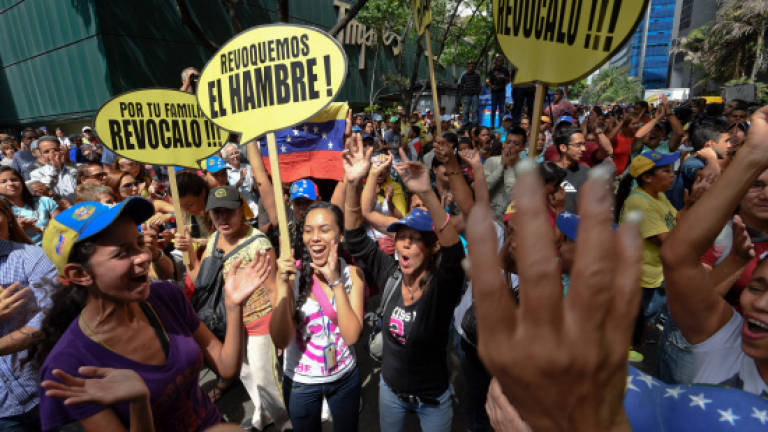Opposition demos draw scant crowds in tense Venezuela

CARACAS: Protesters seeking to oust Venezuela's President Nicolas Maduro staged fresh street rallies Wednesday but drew scant turnout, a setback the divided opposition blamed on repressive tactics and a spiraling economic crisis.
Some 500 Maduro opponents gathered in eastern Caracas, waving the red, yellow and blue Venezuelan flag and banners denouncing the daily woes a crippling recession has wrought on the country: shortages of food and medicine, power cuts and violent crime.
But the numbers remained relatively small, especially given that nearly seven in 10 Venezuelans say they want the leftist president to go.
The rally's leader, former presidential candidate Henrique Capriles, said many Venezuelans could not protest because "most of them are right now queuing for food and medicine".
Other protesters blamed fears of government repression a week after demonstrators braved tear gas during a march against Maduro and the state of emergency he has imposed.
Those disturbances raised fears of deeper unrest in Venezuela, where anti-government rallies in 2014 led to riots that killed 43 people.
"I am marching in fear, but I am marching," said one demonstrator, Daniela Huizi, referring to the threat of government repression.
"If it were not for the strength of arms, they would have nothing."
But experts also pointed to problems and mistakes in the opposition's court.
The low turnout partly reflected divisions between Capriles and other, more radical leaders in the Democratic Unity Roundtable (MUD), a shaky center-right coalition held together mainly by shared hatred of Maduro, political analyst Benigno Alarcon of Andres Bello Catholic University said.
"Capriles kind of did this on his own, to the chagrin of other parties," he said.
Too heavy on politics
Fellow analyst Nicmer Evans said the opposition's game plan of pressuring the electoral authorities to organise a referendum on removing Maduro from office focuses too heavily on politics and not enough on the daily problems facing ordinary Venezuelans.
"People don't feel like these protests represent them," he said. "They want solutions to social problems, not political ones."
The opposition has presented the electoral authorities with the first of two petitions it must file to trigger a recall referendum.
It is now waiting for the signatures to be counted. The National Electoral Board (CNE) has said it will do so by June 2, but the MUD accuses it of dragging its feet.
Although Maduro is deeply unpopular, time is on his side. If the recall referendum is delayed until next year, he could forestall new elections by simply handing power to his allies.
The protesters gathered near a court that recently barred demonstrations outside the CNE's offices.
Protests were also called in 19 other cities, for which opposition leaders said they did not have turnout figures.
A further protest was planned for Thursday near the CNE headquarters in defiance of the court ban, the opposition said on its website.
Students and professors also called protests for Thursday over severe budget shortfalls at public universities.
Running out of options
The opposition is trying to resort to the power of the street after the Supreme Court blocked its efforts to pressure Maduro through the legislature, where it won control in a landslide election victory in December 2015.
The president is said to control the high court and other key state institutions, and so far maintains the public support of the army's top brass – despite Capriles's call for the military to back a recall vote.
In a gesture of defiance to his opponents and the United States, Maduro flexed his muscles last weekend with a series of military exercises.
He blames the crisis on an "economic war" against him by Venezuelan elites with Washington's backing.
Although Venezuela has the largest oil reserves in the world, the fall in crude prices has slashed its revenues.
Venezuelans must wait in line for hours at shops for rations of basic foods and goods such as flour and toilet paper.
The government is also imposing daily electricity blackouts to save energy.
Looting and lynchings of suspected robbers have been reported over recent weeks. — AFP